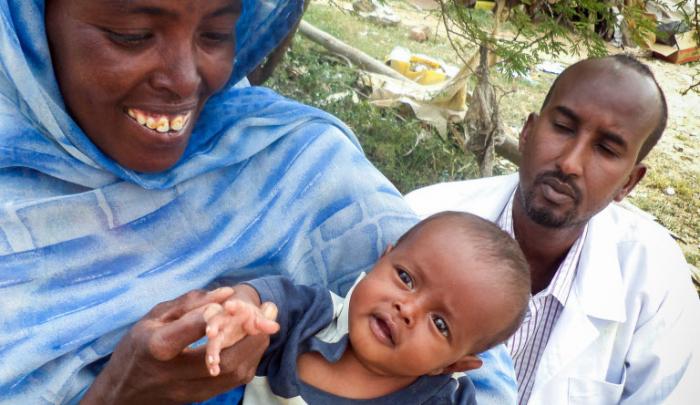
Nairobi, KENYA (July 20, 2014) — Three years ago today, a famine was declared in Somalia. During the famine, 260,000 lives were lost to hunger, malnutrition and disease. Aid agencies today caution, again, that the signs of a drought are re-emerging in Somalia and urge for these not to be ignored in order to avoid a relapse into the conditions of the 2011 catastrophe.
“Responding after a food crisis costs at least three times more than taking preventive action. If we continue to ignore the warning signs, this crisis will cost donors and governments significantly more than acting now,” said Enzo Vecchio, Oxfam Somalia country director.
In the three years since the famine was declared in Somalia, the population in need of urgent assistance has been reduced from 4 million to 2.9 million thanks to moderate improvements in funding, access and general conditions on the ground. Aid agencies have stepped up their support to affected Somalis to not only help them recover but also to avert another crisis, and achieve sustainable, flexible and long term solutions to the cycles of drought and food crisis.
But those gains are now at risk of being reversed because of an extremely poor rainy season, inadequate and less flexible funding levels, conflict and displacement.
Tanja Schuemer, the director of Somalia NGO Consortium, reiterates by saying, “These precious gains, made since 2011, must not be lost because the world no longer considers Somalia as a priority. NGOs’ call to all actors is to listen to the warnings flagged and work with us to address the urgent needs of Somali people. Somalia must never go back to another famine.”
There are currently over 300,000 malnourished children and 2.9 million people needing urgent life-saving and livelihood support in Somalia. The number is expected to rise as conditions continue to worsen. Those who will be hardest hit in the coming months are the 1.1 million internally displaced people across the Somali region.
“Most affected people are still recovering from the massive losses of the 2011 drought and famine. This time, we must not fail the people of Somalia.” Says Francois Batalingaya, World Vision’s country director for Somalia.
In May 2014, agencies warned of the risk of relapse in the humanitarian situation.1 At the time, only 12 percent of Somalia’s annual humanitarian needs had been funded2 out of the required $933 million. The percentage has since risen to 27 percent — still well short of target for the half yearly point. The current funding gap means that programs addressing these needs and delivering vital basic services are at risk of shutting down.
Agencies are calling for urgent and consistent support in the next three to six months to avoid a relapse to the 2011 catastrophe.
In the 2011 famine, it took 16 early warnings and finally a declaration of famine, before action and adequate funding was finally made available. To date, eight warnings of an impending food crisis across Somalia have been issued since January 2014. In order for humanitarian organizations to continue lifesaving and resilience work in Somalia, it is critical that international and national leaders remain fully committed to supporting humanitarian and development work by increasing access to isolated communities and providing sufficient funding.
“Though the number of afflicted has declined, Somali men, women and children still need more donor commitment to funding humanitarian assistance long term. Principles of International Humanitarian law need to be upheld by all parties to the conflict, ensuring unhindered humanitarian access to populations in need to avert this imminent humanitarian crisis.” Says Degan Ali, executive director of Adeso.
– END –
For more information, contact:
- John Kisimir, Senior Communication Manager, World Vision Somalia +254.708077436
- Aimee Brown, Regional Media and Communications Advisor, Oxfam | Horn, East and Central Africa +254.731.859.413
- Brenda Wawa, Senior Information Officer, Somalia NGO Consortium +254.715819521
NGOs signed:
ACF Somalia
Adeso
CARE
FCA
Islamic Relief Worldwide
Medair
Muslim Aid
Oxfam
WASDA
World VisionACTED
ARC
CISP
Intersos
Jubbalandese Charity Centre (JCC)
Mercy Corps
NRC
Solidarites International
World Relief Germany
Footnotes:
1Risk of Relapse Report (PDF)
2http://fts.unocha.org/pageloader.aspx?page=emergencyDetails&appealID=1037
3Risk of Relapse Call to Action (PDF)
About World Vision:
World Vision is a Christian humanitarian organization conducting relief, development, and advocacy activities in its work with children, families, and their communities in nearly 100 countries to help them reach their full potential by tackling the causes of poverty and injustice. World Vision serves all people regardless of religion, race, ethnicity, or gender. For more information, please visit www.WorldVision.org/media-center/ or on Twitter @WorldVisionUSA.
Highlights
- It took 16 warnings for the international community to respond to the last catastrophe
- Lessons must be learnt from the past to avert another crisis in the Horn of Africa